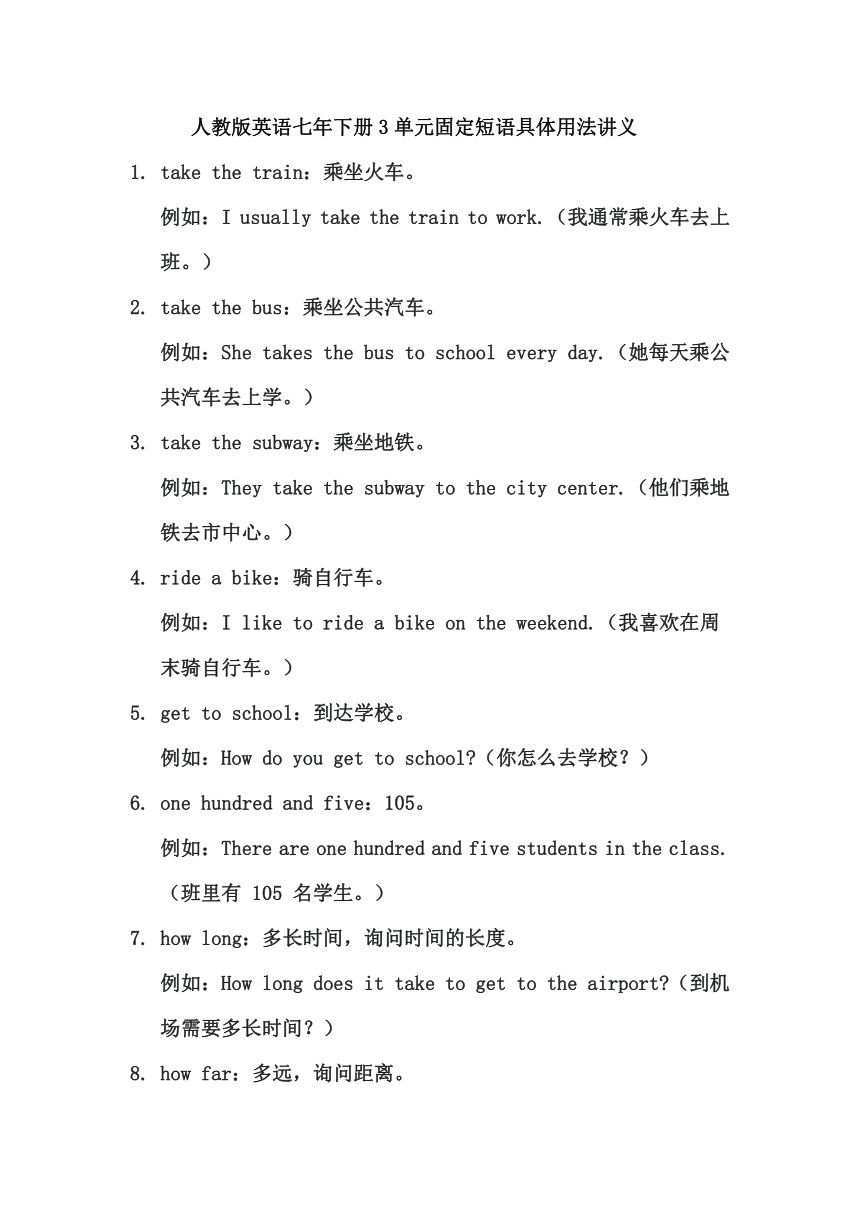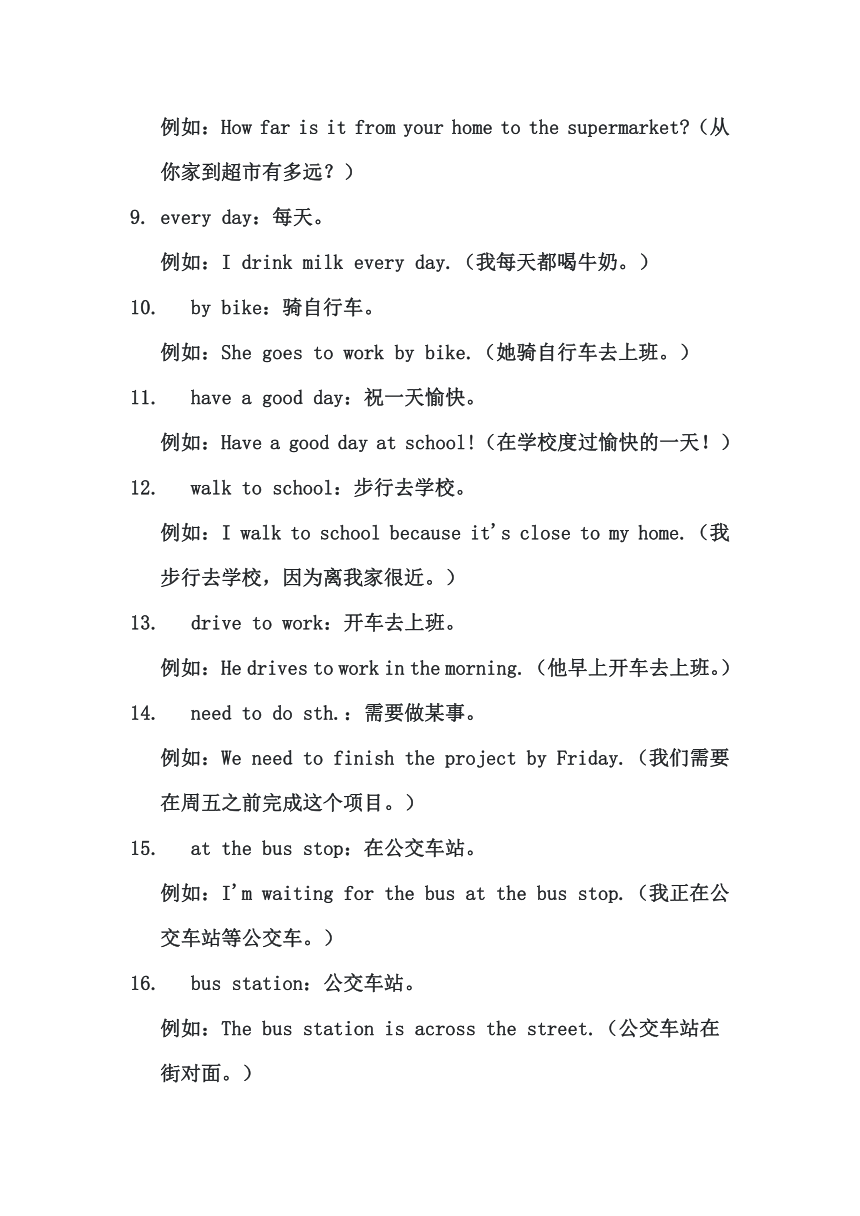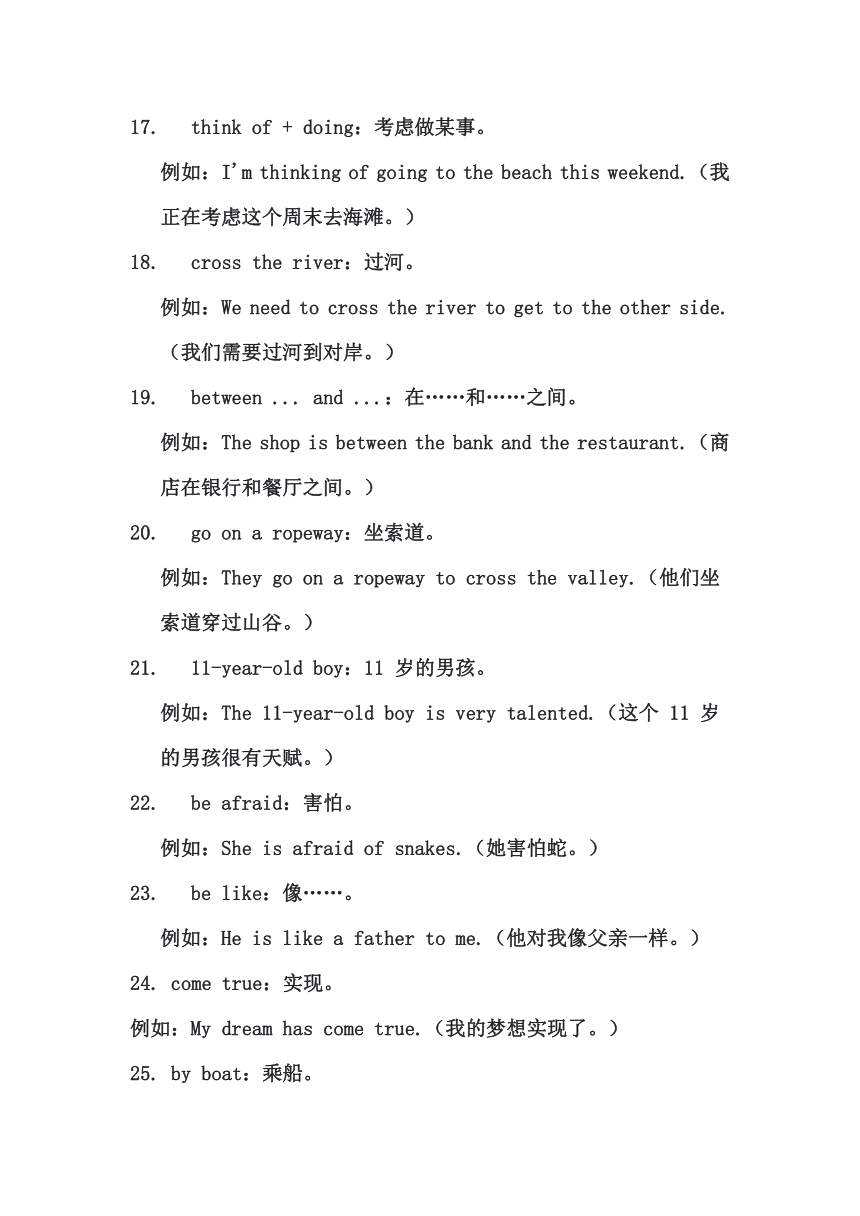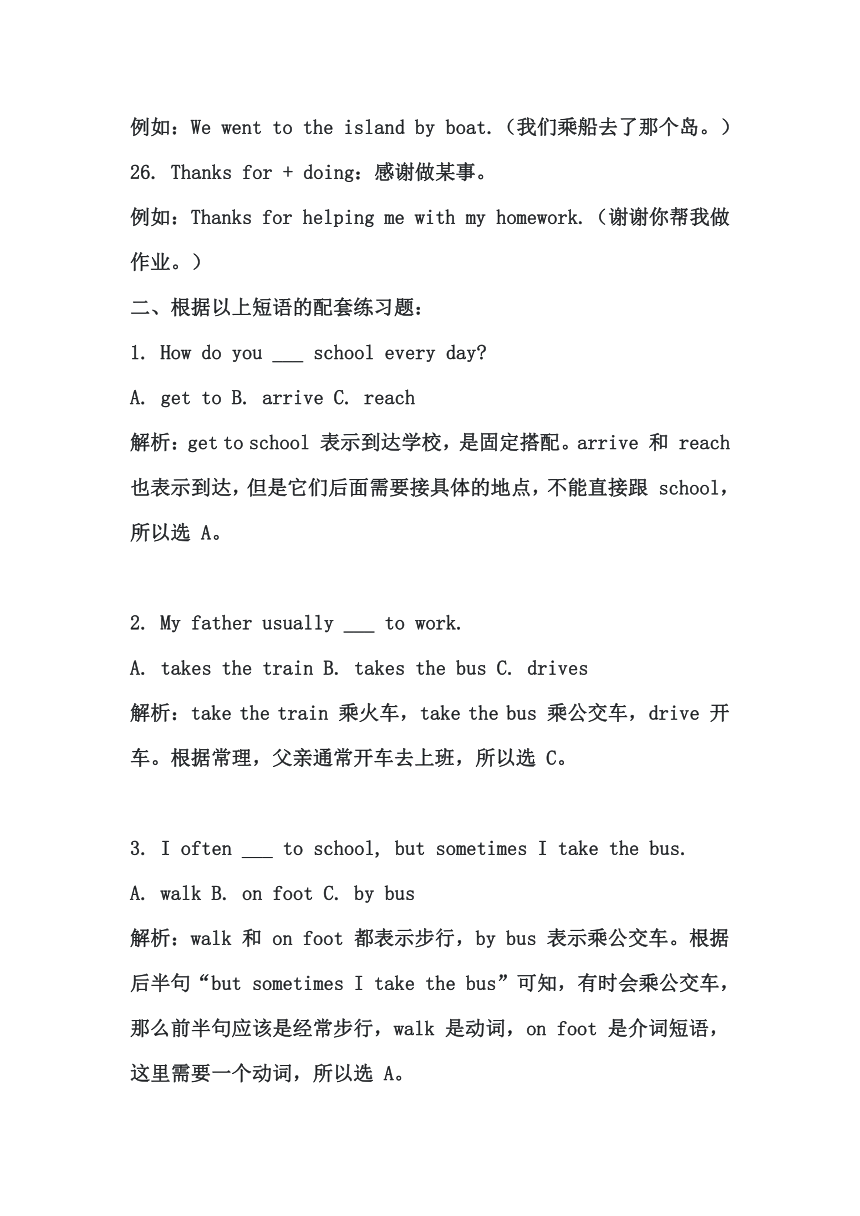Unit 3 How do you get to school?单元固定短语具体用法讲义
文档属性
| 名称 | Unit 3 How do you get to school?单元固定短语具体用法讲义 |

|
|
| 格式 | docx | ||
| 文件大小 | 23.9KB | ||
| 资源类型 | 教案 | ||
| 版本资源 | 人教新目标(Go for it)版 | ||
| 科目 | 英语 | ||
| 更新时间 | 2024-02-07 00:00:00 | ||
图片预览




文档简介
人教版英语七年下册3单元固定短语具体用法讲义
take the train:乘坐火车。
例如:I usually take the train to work.(我通常乘火车去上班。)
take the bus:乘坐公共汽车。
例如:She takes the bus to school every day.(她每天乘公共汽车去上学。)
take the subway:乘坐地铁。
例如:They take the subway to the city center.(他们乘地铁去市中心。)
ride a bike:骑自行车。
例如:I like to ride a bike on the weekend.(我喜欢在周末骑自行车。)
get to school:到达学校。
例如:How do you get to school (你怎么去学校?)
one hundred and five:105。
例如:There are one hundred and five students in the class.(班里有 105 名学生。)
how long:多长时间,询问时间的长度。
例如:How long does it take to get to the airport (到机场需要多长时间?)
how far:多远,询问距离。
例如:How far is it from your home to the supermarket (从你家到超市有多远?)
every day:每天。
例如:I drink milk every day.(我每天都喝牛奶。)
by bike:骑自行车。
例如:She goes to work by bike.(她骑自行车去上班。)
have a good day:祝一天愉快。
例如:Have a good day at school!(在学校度过愉快的一天!)
walk to school:步行去学校。
例如:I walk to school because it's close to my home.(我步行去学校,因为离我家很近。)
drive to work:开车去上班。
例如:He drives to work in the morning.(他早上开车去上班。)
need to do sth.:需要做某事。
例如:We need to finish the project by Friday.(我们需要在周五之前完成这个项目。)
at the bus stop:在公交车站。
例如:I'm waiting for the bus at the bus stop.(我正在公交车站等公交车。)
bus station:公交车站。
例如:The bus station is across the street.(公交车站在街对面。)
think of + doing:考虑做某事。
例如:I'm thinking of going to the beach this weekend.(我正在考虑这个周末去海滩。)
cross the river:过河。
例如:We need to cross the river to get to the other side.(我们需要过河到对岸。)
between ... and ...:在……和……之间。
例如:The shop is between the bank and the restaurant.(商店在银行和餐厅之间。)
go on a ropeway:坐索道。
例如:They go on a ropeway to cross the valley.(他们坐索道穿过山谷。)
11-year-old boy:11 岁的男孩。
例如:The 11-year-old boy is very talented.(这个 11 岁的男孩很有天赋。)
be afraid:害怕。
例如:She is afraid of snakes.(她害怕蛇。)
be like:像……。
例如:He is like a father to me.(他对我像父亲一样。)
e true:实现。
例如:My dream has come true.(我的梦想实现了。)
25. by boat:乘船。
例如:We went to the island by boat.(我们乘船去了那个岛。)
26. Thanks for + doing:感谢做某事。
例如:Thanks for helping me with my homework.(谢谢你帮我做作业。)
二、根据以上短语的配套练习题:
1. How do you ___ school every day
A. get to B. arrive C. reach
解析:get to school 表示到达学校,是固定搭配。arrive 和 reach 也表示到达,但是它们后面需要接具体的地点,不能直接跟 school,所以选 A。
2. My father usually ___ to work.
A. takes the train B. takes the bus C. drives
解析:take the train 乘火车,take the bus 乘公交车,drive 开车。根据常理,父亲通常开车去上班,所以选 C。
3. I often ___ to school, but sometimes I take the bus.
A. walk B. on foot C. by bus
解析:walk 和 on foot 都表示步行,by bus 表示乘公交车。根据后半句“but sometimes I take the bus”可知,有时会乘公交车,那么前半句应该是经常步行,walk 是动词,on foot 是介词短语,这里需要一个动词,所以选 A。
4. It takes him about an hour ___ to school.
A. to get B. getting C. get
解析:It takes sb. some time to do sth. 是一个固定句型,意思是“花费某人一些时间做某事”。其中 it 是形式主语,真正的主语是后面的 to do sth.,所以选 A。
5. The subway is very convenient. It only takes about 20 minutes ___.
A. by subway B. to take the subway C. taking the subway
解析:It takes some time to do sth. 表示“做某事花费多少时间”,这里是说坐地铁只需要大约 20 分钟,to take the subway 是真正的主语,所以选 B。
6. -- ___ is it from your home to school
-- About two kilometers.
A. How long B. How far C. How many
解析:How long 询问时间或物体的长度,How far 询问距离,How many 询问数量。根据回答“About two kilometers.”可知是询问距离,所以选 B。
7. The river is too wide. We need ___ a boat to cross it.
A. to take B. taking C. take
解析:need to do sth. 表示需要做某事,这里是说需要乘船过河,to take 是不定式,所以选 A。
8. There is a ___ between the library and the post office.
A. bridge B. village C. river
解析:bridge 表示桥,village 表示村庄,river 表示河。根据句意“在图书馆和邮局之间有一个___”,图书馆和邮局之间应该是有一座桥,所以选 A。
9. Do you know the ___ to the park
A. way B. road C. street
解析:the way to 表示“去……的路”,是固定搭配。road 和 street 都表示道路,但是没有 the road to 和 the street to 的用法,所以选 A。
10. The ___ boy is very smart.
A. 11-year-old B. 11 years old C. 11-year-olds
解析:11-year-old 是一个复合形容词,用来修饰后面的名词 boy,表示“11 岁的”。11 years old 通常作表语,不修饰名词。11-year-olds 是 11-year-old 的复数形式,但是这里 boy 是单数,所以选 A。
11. I ___ you have a good day.
A. hope B. want C. wish
解析:hope 希望,通常表示可以实现的愿望;wish 希望、祝愿,通常表示不太可能实现或与现实相反的愿望;want 想要。这里是祝愿对方有美好的一天,用 wish 更合适,所以选 C。
12. She thinks ___ is a good way to keep fit.
A. walking B. to walk C. walk
解析:think of + doing 表示“考虑做某事”,think 后面不能直接跟动词原形。根据句意“她认为___是保持健康的好方法”,这里应该是“散步”,用 walking,所以选 A。
13. You should ___ early if you want to catch the early bus.
A. get up B. stand up C. wake up
解析:get up 起床,stand up 站起来,wake up 醒来。根据句意“如果你想赶上早班车,你应该___早”,应该是早起,所以选 A。
14. My home is not far from the school. I ___ walk to school.
A. need to B. like to C. can
解析:need to 需要,like to 喜欢,can 可以。根据前半句“我家离学校不远”可知,“我”可以步行去学校,can 表示能力,所以选 C。
15. Thanks for ___ me with my English.
A. help B. helping C. to help
解析:Thanks for doing sth. 表示“感谢做某事”,for 是介词,后面跟动词的-ing 形式,所以选 B。
take the train:乘坐火车。
例如:I usually take the train to work.(我通常乘火车去上班。)
take the bus:乘坐公共汽车。
例如:She takes the bus to school every day.(她每天乘公共汽车去上学。)
take the subway:乘坐地铁。
例如:They take the subway to the city center.(他们乘地铁去市中心。)
ride a bike:骑自行车。
例如:I like to ride a bike on the weekend.(我喜欢在周末骑自行车。)
get to school:到达学校。
例如:How do you get to school (你怎么去学校?)
one hundred and five:105。
例如:There are one hundred and five students in the class.(班里有 105 名学生。)
how long:多长时间,询问时间的长度。
例如:How long does it take to get to the airport (到机场需要多长时间?)
how far:多远,询问距离。
例如:How far is it from your home to the supermarket (从你家到超市有多远?)
every day:每天。
例如:I drink milk every day.(我每天都喝牛奶。)
by bike:骑自行车。
例如:She goes to work by bike.(她骑自行车去上班。)
have a good day:祝一天愉快。
例如:Have a good day at school!(在学校度过愉快的一天!)
walk to school:步行去学校。
例如:I walk to school because it's close to my home.(我步行去学校,因为离我家很近。)
drive to work:开车去上班。
例如:He drives to work in the morning.(他早上开车去上班。)
need to do sth.:需要做某事。
例如:We need to finish the project by Friday.(我们需要在周五之前完成这个项目。)
at the bus stop:在公交车站。
例如:I'm waiting for the bus at the bus stop.(我正在公交车站等公交车。)
bus station:公交车站。
例如:The bus station is across the street.(公交车站在街对面。)
think of + doing:考虑做某事。
例如:I'm thinking of going to the beach this weekend.(我正在考虑这个周末去海滩。)
cross the river:过河。
例如:We need to cross the river to get to the other side.(我们需要过河到对岸。)
between ... and ...:在……和……之间。
例如:The shop is between the bank and the restaurant.(商店在银行和餐厅之间。)
go on a ropeway:坐索道。
例如:They go on a ropeway to cross the valley.(他们坐索道穿过山谷。)
11-year-old boy:11 岁的男孩。
例如:The 11-year-old boy is very talented.(这个 11 岁的男孩很有天赋。)
be afraid:害怕。
例如:She is afraid of snakes.(她害怕蛇。)
be like:像……。
例如:He is like a father to me.(他对我像父亲一样。)
e true:实现。
例如:My dream has come true.(我的梦想实现了。)
25. by boat:乘船。
例如:We went to the island by boat.(我们乘船去了那个岛。)
26. Thanks for + doing:感谢做某事。
例如:Thanks for helping me with my homework.(谢谢你帮我做作业。)
二、根据以上短语的配套练习题:
1. How do you ___ school every day
A. get to B. arrive C. reach
解析:get to school 表示到达学校,是固定搭配。arrive 和 reach 也表示到达,但是它们后面需要接具体的地点,不能直接跟 school,所以选 A。
2. My father usually ___ to work.
A. takes the train B. takes the bus C. drives
解析:take the train 乘火车,take the bus 乘公交车,drive 开车。根据常理,父亲通常开车去上班,所以选 C。
3. I often ___ to school, but sometimes I take the bus.
A. walk B. on foot C. by bus
解析:walk 和 on foot 都表示步行,by bus 表示乘公交车。根据后半句“but sometimes I take the bus”可知,有时会乘公交车,那么前半句应该是经常步行,walk 是动词,on foot 是介词短语,这里需要一个动词,所以选 A。
4. It takes him about an hour ___ to school.
A. to get B. getting C. get
解析:It takes sb. some time to do sth. 是一个固定句型,意思是“花费某人一些时间做某事”。其中 it 是形式主语,真正的主语是后面的 to do sth.,所以选 A。
5. The subway is very convenient. It only takes about 20 minutes ___.
A. by subway B. to take the subway C. taking the subway
解析:It takes some time to do sth. 表示“做某事花费多少时间”,这里是说坐地铁只需要大约 20 分钟,to take the subway 是真正的主语,所以选 B。
6. -- ___ is it from your home to school
-- About two kilometers.
A. How long B. How far C. How many
解析:How long 询问时间或物体的长度,How far 询问距离,How many 询问数量。根据回答“About two kilometers.”可知是询问距离,所以选 B。
7. The river is too wide. We need ___ a boat to cross it.
A. to take B. taking C. take
解析:need to do sth. 表示需要做某事,这里是说需要乘船过河,to take 是不定式,所以选 A。
8. There is a ___ between the library and the post office.
A. bridge B. village C. river
解析:bridge 表示桥,village 表示村庄,river 表示河。根据句意“在图书馆和邮局之间有一个___”,图书馆和邮局之间应该是有一座桥,所以选 A。
9. Do you know the ___ to the park
A. way B. road C. street
解析:the way to 表示“去……的路”,是固定搭配。road 和 street 都表示道路,但是没有 the road to 和 the street to 的用法,所以选 A。
10. The ___ boy is very smart.
A. 11-year-old B. 11 years old C. 11-year-olds
解析:11-year-old 是一个复合形容词,用来修饰后面的名词 boy,表示“11 岁的”。11 years old 通常作表语,不修饰名词。11-year-olds 是 11-year-old 的复数形式,但是这里 boy 是单数,所以选 A。
11. I ___ you have a good day.
A. hope B. want C. wish
解析:hope 希望,通常表示可以实现的愿望;wish 希望、祝愿,通常表示不太可能实现或与现实相反的愿望;want 想要。这里是祝愿对方有美好的一天,用 wish 更合适,所以选 C。
12. She thinks ___ is a good way to keep fit.
A. walking B. to walk C. walk
解析:think of + doing 表示“考虑做某事”,think 后面不能直接跟动词原形。根据句意“她认为___是保持健康的好方法”,这里应该是“散步”,用 walking,所以选 A。
13. You should ___ early if you want to catch the early bus.
A. get up B. stand up C. wake up
解析:get up 起床,stand up 站起来,wake up 醒来。根据句意“如果你想赶上早班车,你应该___早”,应该是早起,所以选 A。
14. My home is not far from the school. I ___ walk to school.
A. need to B. like to C. can
解析:need to 需要,like to 喜欢,can 可以。根据前半句“我家离学校不远”可知,“我”可以步行去学校,can 表示能力,所以选 C。
15. Thanks for ___ me with my English.
A. help B. helping C. to help
解析:Thanks for doing sth. 表示“感谢做某事”,for 是介词,后面跟动词的-ing 形式,所以选 B。
同课章节目录
- Unit 1 Can you play the guitar?
- Section A
- Section B
- Unit 2 What time do you go to school?
- Section A
- Section B
- Unit 3 How do you get to school?
- Section A
- Section B
- Unit 4 Don't eat in class.
- Section A
- Section B
- Unit 5 Why do you like pandas?
- Section A
- Section B
- Unit 6 I'm watching TV.
- Section A
- Section B
- Review of Units 1-6
- Unit 7 It's raining!
- Section A
- Section B
- Unit 8 Is there a post office near here?
- Section A
- Section B
- Unit 9 What does he look like?
- Section A
- Section B
- Unit 10 I'd like some noodles.
- Section A
- Section B
- Unit 11 How was your school trip?
- Section A
- Section B
- Unit 12 What did you do last weekend?
- Section A
- Section B
